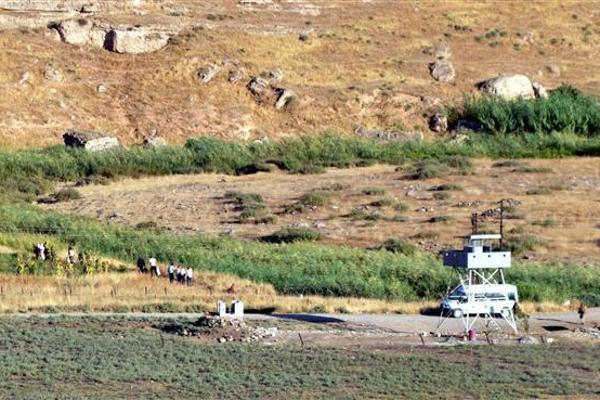Turkish army working on buffer zone plans against ISIL
Sevil Erkuş ANKARA


The situation on Turkey's southern borders is becoming increasingly heated. DHA Photo
The Turkish Armed Forces (TSK) is drawing up plans for a possible buffer zone along the border inside northern Syria that could be established with the contribution of U.S.-led coalition forces.“The TSK is working on plans and will present them to us, and we will decide if it is necessary,” President Recep Tayyip Erdoğan was quoted as saying.
In recent talks with U.S. officials, Ankara demanded a buffer zone in northern Syria in the event of a military campaign of air strikes in the country against jihadists that could precipitate a massive influx of refugees into Turkish territory.
Turkey has been urging the international community to establish a safe haven in northern Syria since 2011, but could not receive positive feedback due to Washington’s reluctance at military involvement in Syria.
However, a no-fly zone, required for establishing a buffer zone in northern Syria, needs the support of a U.N. Security Council decision which is likely to be vetoed by Russia and China. It is believed that Turkey’s attempt to establish a buffer zone is in line with the United Nations Security Council resolution No. 2170, which calls on all U.N. member states to act to suppress the flow of foreign fighters, financing and other support to Islamist extremist groups in Iraq and Syria.
Turkey deports 1,000 jihadists
Meanwhile, Turkish Foreign Minister Mevlüt Çavuşoğlu told a Paris conference on Sept. 15 about Ankara’s difficulties at controlling the nearly 700-kilometer-long border between Turkey and Syria, but noted the increased security measures along the border, adding that roughly 1,000 foreign jihadists had been deported by Ankara.
Turkey also presented information on its efforts on humanitarian assistance to Iraq since the beginning of the jihadist onslaught.
Turkey, meanwhile, did not endorse an international military campaign against the Islamic State of Iraq and the Levant (ISIL) at the conclusion of the Paris conference. Ankara also refused to make any commitment on the issue of a combat operation, a Turkish diplomat said.
“We have kept our stance that was declared during the Jeddah talks,” the diplomat said. Turkey did not sign the final declaration in Jeddah.
A senior Turkish official said Ankara did not sign the communiqué in part due to the sensitivity of efforts to free 49 Turkish hostages captured by ISIL fighters in Mosul in June.
On the ground, the United States bombed militants near Baghdad in support of Iraqi forces, striking close to the capital for the first time in its expanded campaign against ISIL.
The U.S. air strike against ISIL fighters in the Sadr al-Yusufiyah area, 25 kilometers from Baghdad, came as world diplomats in Paris pledged to support Iraq in its fight against the militants and less than a week after U.S. President Barack Obama ordered a “relentless” war against ISIL.
“U.S. military forces continued to attack terrorists in Iraq, employing attack and fighter aircraft to conduct two air strikes Sunday and Monday in support of Iraqi security forces near Sinjar and southwest of Baghdad,” the U.S. Central Command said in a statement. “The air strike southwest of Baghdad was the first strike taken as part of our expanded efforts beyond protecting our own people and humanitarian missions to hit targets as Iraqi forces go on offence, as outlined in the president’s speech last week.”
The strikes destroyed six ISIL vehicles near Sinjar and an ISIL position southwest of Baghdad that had been firing on Iraqi forces. The attacks brought the number of U.S. air strikes across Iraq to 162.
